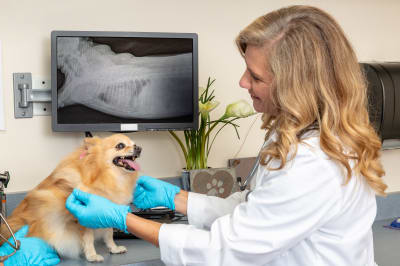If your dog requires an x-ray diagnostic test (also known as a radiograph), you might be wondering how their appointment will go. Here, our South Wilton Veterinary Group vet team will walk you through what to expect when you take your dog in for an x-ray, what x-rays are used to diagnose, and any risks that might be presented by an x-ray test.
What Can X-rays Help Vets Diagnose?
X-rays are one of the most frequently used diagnostic tests for both human and veterinary healthcare. They are also one of the most helpful. X-rays allow your vet to see your dog's bones, tissue, and internal organs so that they can accurately diagnose issues that they wouldn't otherwise be able to see. There can include, bladder stones, foreign objects your pup has swallowed, and broken bones.
X-rays can also help your Fairfield County vet spot tumors, enlarged organs, and pregnancies which can all lead to helpful diagnoses which will start your pooch down the path of returning to full health.
X-rays, however, aren't able to produce detailed views of organs, tissues, ligaments, and other "soft" internal structures in your dog. They also aren't able to provide moment-to-moment images of your dog's internal processes. Other diagnostic imaging technologies like MRI and Ultrasound are more beneficial for these instances.
Learn More About Our Diagnostic Imaging
How Can I Prepare My Dog For Their X-ray Appointment?
An x-ray is usually done when a pet parent brings their pup in for an examination of an issue. Because of this, there isn't any specific prep you need to do for your pup to undergo the procedure. When your pet and you arrive at the veterinary clinic, your vet will conduct a physical exam of your dog, determine if an x-ray is required to make a diagnosis, and then walk you through the steps of the procedure.
Will My Dog Be Sedated When They Have Their X-ray?
Sedation is only sometimes required for x-ray diagnostic tests. If your dog is calm, able to lay comfortably on its side, and isn't in too much pain, sedation won't be necessary to get a clear x-ray picture.
However, if your dog is in pain, edgy, or squirming a lot, your vet won't be able to get a clear picture. In this case, they will recommend sedation. Your dog may also need to be sedated if the specific x-ray being taken needs their muscles to be relaxed or if it is being done on your pet's spine, skull, or teeth.
Are X-rays Safe For Dogs?
X-rays are considered very safe for dogs. However, radiation is involved in the procedure (even if it is a very small amount) so x-rays are only used occasionally and when they are needed as a diagnostic tool. In some cases, vets will use x-ray technology to gain information about your pup's pregnancy, but other forms of diagnostic imaging like ultrasound are usually used for this purpose instead.
If you are worried about your dog undergoing an x-ray test, speak to your vet. They will be happy to sit down with you, explain their reasoning for recommending an x-ray, and answer any questions you might have. They will also explain any risks and benefits involved in an x-ray test in your dog's specific case.
How Much Will My Dog's X-rays Cost?
There is a wide range of factors. that will influence the cost of your dog's x-ray procedure. This includes the area that is being x-rays, the size of your dog, whether they needed to be sedated, what type of vet clinic is conducting the procedure, where that clinic is located, and more.
If you are worried about the cost of your pup's x-ray procedure, speak to your vet before moving forward with it.
Note: The advice provided in this post is intended for informational purposes and does not constitute medical advice regarding pets. For an accurate diagnosis of your pet's condition, please make an appointment with your vet.
Is your dog suffering from a condition or illness that might require an x-ray? At South Wilton Veterinary Group, we offer a wide range of diagnostic tools and tests to help our experienced team of veterinarians diagnoses your dog's health issues. Contact us today to book an appointment!
 Looking for a vet in South Wilton?
Looking for a vet in South Wilton?
We're always accepting new patients, so contact our veterinary hospital today to book your pet's first appointment.
Related Articles View All
C-Section for Dogs: Everything You Should Know
Our South Wilton vets share some information about c-sections in dogs, when they might be needed, and what you can expect.
Enucleation: Eye Removal in Cats & Dogs
Learning that your cat or dog needs eye removal surgery can be upsetting, and you'll probably have many questions. Our veterinarians in South Wilton explain pet eye removal, recovery times, potential complications, and more.
Understanding Blood Tests for Dogs
Dogs and cats often require diagnostic blood tests to reveal vital health information about underlying health conditions. In this post, our veterinarians at South Wilton explain the significance of these tests for pets.
What Are the Symptoms of a Spider Bite on a Dog?
In some cases, the spider bites our South Wilton vets see on dogs cause serious symptoms that necessitate immediate medical attention; however, most spider bites on dogs cause minor irritation but are generally harmless.

